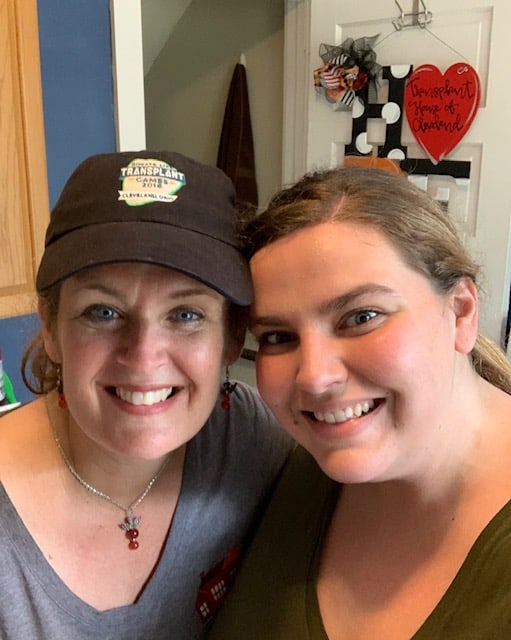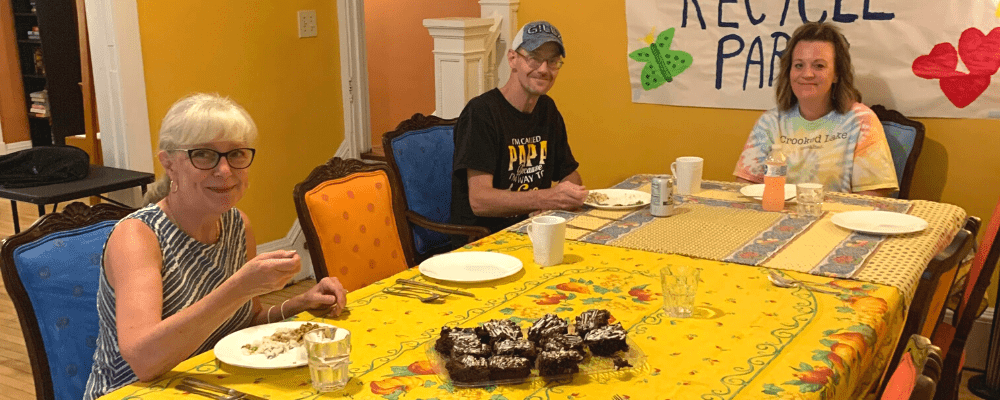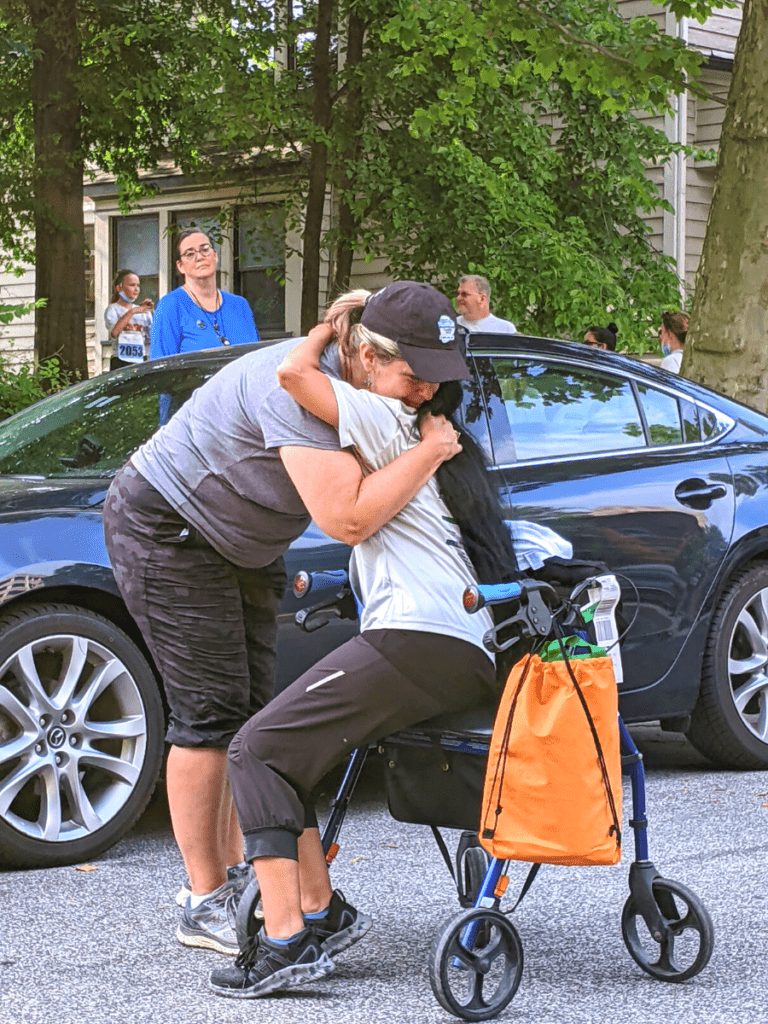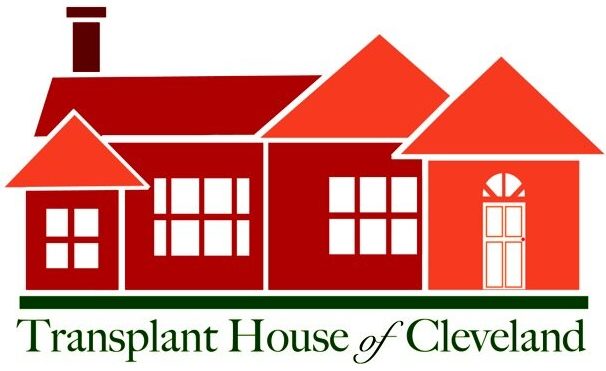
Annette Humberson joined the Transplant House staff in March of 2020 as Transplant House’s Social Work Manager. You can read the first part of our series on social work at Transplant House here.
* To protect their privacy, the names of the guests referred to in this piece have been substituted for pseudonyms.
The afternoon sun pours through the windows of Transplant House’s programming space, brightening the room’s light blue walls. Visible just outside of the window is the duplex’s front porch with its rocking chairs and a porch swing. Sitting in this room, surrounded by thoughtful decorative touches, it feels like being in someone’s home.
For Annette Humberson, Transplant House’s Social Work Manager, this welcoming, calming, and quiet environment is an essential element of her outreach to – and support of – guests. It’s a way to break the ice.
And Annette is deliberate in shaping the House’s social work programming to create a space where guests can be open and vulnerable. She has years of experience as a transplant social worker at the Cleveland Clinic, so she knows how the evaluation process works, understands the system, and appreciates the complexity of the experience for families. For Annette, the advantage now is that she understands the procedures, but she can focus her attention elsewhere – such as, helping patients and caregivers to understand what they are being told by their care team, why they are being asked to do certain things, and assist them in meeting those requirements for hopeful listing or transplant.
“My focus is not on reporting, but rather on understanding what families feel and what they are going through on a day-to-day basis,” Annette says. “And that allows us to create programming that helps each guest feel supported in the way that is most meaningful to them.”
In the case of one house guest, Trisha, Annette knew from what she was being told to do by her social worker that there were concerns about her ability to be an effective caregiver to her husband. Annette also knew that these concerns would weigh in the decision of whether her husband would be listed for a liver transplant.
“When she came in, she was so closed,” Elaine Turley, Transplant House’s Executive Director, remembers of Trisha. “Now she’s meeting other guests, helping them, and doing the things she needs to do to assure the hospital that listing her husband is the right thing. If he does get listed, I would be confident in saying that this House made that happen, because Annette’s been spending so much time with his wife.”
“There’s a whole population of people,” Elaine continues, “who, for a variety of reasons, can’t demonstrate to the hospitals that they can be effective caregivers. Do they have a ride to the hospital, can they be present for every appointment, or will they be able to have a caregiver bring them in at the drop of a hat? Personally, it’s been my dream that because of this House, somebody that wouldn’t have had the opportunity to be listed for transplant gets that chance.”
Elaine and Annette see Transplant House’s social work programming as complimentary to the social work that happens in the hospitals. The House’s programming and resources reinforce what families hear from their social worker at the hospital while also creating a space for families who feel overwhelmed and on-guard to open up about all aspects of their transplant journey.
“I think you have to meet people holistically,” Claire says. Claire is the House’s former Social Work Intern and is now a volunteer with the organization’s programming committee. “At the hospital, they are there to meet your medical needs. That’s their role; it’s a really important one. And that’s why they are so focused on those needs. But here we try to meet other needs, too, like making sure people are eating regularly and eating well. And ensuring that their emotional needs are being addressed.”
This is especially true for caregivers who are often so focused on supporting their loved one that their own needs are not addressed or even acknowledged by the caregivers themselves. In addition to the financial stress and the daily worry that comes with having a loved one on the transplant journey, caregivers can also experience feelings of fear, confusion, guilt, anger, and frustration that are harder – if not impossible – to articulate when in the hospital.
“At the hospital they are right there with their loved one who is undergoing the procedure,” Claire explains. “And you’ll hear them say ‘I have to be strong for them. I’m the one that’s pushing them to keep a positive attitude, to take just one step today even if it hurts.’ So they can’t be vulnerable there. If they don’t put on a brave face for their loved one, they really might not be able to get through it. I believe almost all our caregivers feel and know that on some level.”
A significant part of Annette’s work is crafting a space where guests feel that they can comfortably, privately, and safely share what their experiences have been, how they are feeling, and their worries for that day – and other days – ahead.
“Annette has a pulse on everybody,” Elaine says. “And different ways of connecting with guests than you could ever have in the hospital. Just think about the breakfasts.”

Annette and Claire began providing caregiver breakfasts each Tuesday in the fall of 2021. The gatherings allow guests to grab-and-go breakfast or sit down and enjoy a morning meal and a conversation to start the day. In addition to providing guests with a homecooked breakfast and some snacks to take to the hospital, the gatherings are a way to introduce Annette to the guests and to create conversations and connections between guests. The value of the genuine connections – and lasting friendships – made between guests at the breakfasts is incalculable.
“The thing about breakfast is that even though its only one day a week it makes people more likely to come in the morning on other days even if it’s just for a coffee or to have a quick chat before boarding the shuttle,” Annette says. “And if we can help somebody start their day off with a feeling of ‘I just spent a few minutes in the office’ or ‘I rode the hospital shuttle with two other people who are in a similar place as me,’ maybe it’s not quite so hard to face the day ahead because they have met others going through a similar experience.”
“The hospital is not their world,” she adds. “It can be very traumatizing and scary. But it is hard for those who work in that environment every day to see that in caregivers and patients, because that’s the world they work in. They’re so used to it – because they have to be – that sometimes they can’t see it: how far away from the familiar people are when they arrive, how overwhelming all of it is to them, and how frightening the treatment itself is to someone new to the world of transplant.”
Through the breakfasts and Annette’s one-on-one outreach to guests, Transplant House’s social work programming creates a familiar and home-like environment – a place that makes guests feel supported not only as patients and caregivers, but as people.
“What I hope we can do,” Annette shares, “as we build our programming is to not only think about what our guests need, but also what we can – in the unique position we are in – contribute that is different from what the hospitals provide.”
A striking example of this is the Alcoholics Anonymous program specific to transplant patients, a population that is unique in that they struggle with how to live with a transplant (or the need for a transplant) and how to live with addiction. In 2021, the group met twenty-four times. The response from attendees was overwhelmingly positive and the intention is to expand the program to fifty meetings this year. For Annette, these gatherings provide a vital service that helps address more than addiction: it also prepares the participants for the rigorous demands of the transplant journey.
“You’re talking about someone who has struggled with addiction, and you are putting them into a medical treatment process that requires absolute compliance every single day. They need all the support that they can get.”
Programming such as the AA meetings, the Tuesday Breakfasts, and the one-on-one outreach to guests ensure that what guests are hearing from social workers at the hospitals are reinforced and supplemented when they are at Transplant House.
“We’re so lucky to have not just a social worker but a clinical transplant social worker with 17 years of experience in transplant,” Elaine says. “What Annette does here is not a duplication of what social workers do in the hospitals – it is an enhancement. And I’d really like the hospital to understand that we’re complimenting their work. We can spend time with individual families to help walk them through the process as needed. We’re looking at ways to expand our support for continued outreach when they go home and for patients in the Greater Cleveland community. We are working closely with the Cleveland chapter of TRIO (Transplant Recipients International Organization) in expanding the Partners program to be hybrid with an in-person option here and virtually.”

Ultimately, Transplant House’s Social Work programming is guided by the knowledge that what guests need most is a sense of feeling supported; not just medically and financially, but emotionally as well. They need a place to express their worries about an unfamiliar journey, to have a place where they can feel safe being vulnerable, to confide in another person who is not only a resource, but also a non-judgmental and non-evaluative listener. Simply put, it is about creating conditions that nurture connections between people – between those on the challenging road to transplant and between guests and Annette in her role as a counselor, resource, and friendly ear always ready to listen. “My hope,” Annette shares, “is that when guests come here after a long day, they can let their guard down and what they’ve been thinking about all day is able to come out.”
